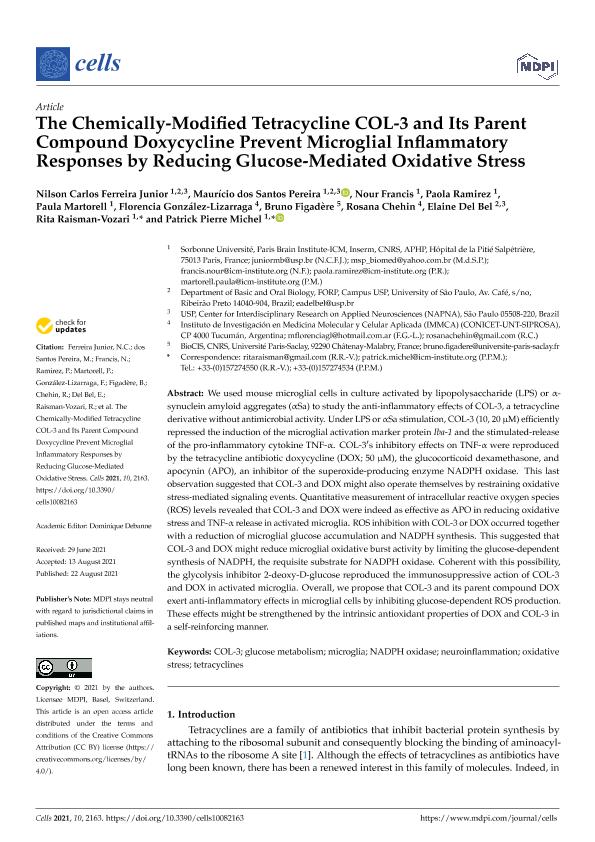Artículo
The chemically-modified tetracycline COL-3 and its parent compound doxycycline prevent microglial inflammatory responses by reducing glucose-mediated oxidative stress
Ferreira Junior, Nilson Carlos; Dos Santos Pereira, Maurício; Francis, Nour; Ramirez, Paola; Martorell, Paula; González Lizarraga, Maria Florencia ; Figadère, Bruno; Chehin, Rosana Nieves
; Figadère, Bruno; Chehin, Rosana Nieves ; del Bel Belluz Guimaraes, Elaine; Raisman Vozari, Rita; Michel, Patrick Pierre
; del Bel Belluz Guimaraes, Elaine; Raisman Vozari, Rita; Michel, Patrick Pierre
 ; Figadère, Bruno; Chehin, Rosana Nieves
; Figadère, Bruno; Chehin, Rosana Nieves ; del Bel Belluz Guimaraes, Elaine; Raisman Vozari, Rita; Michel, Patrick Pierre
; del Bel Belluz Guimaraes, Elaine; Raisman Vozari, Rita; Michel, Patrick Pierre
Fecha de publicación:
22/08/2021
Editorial:
MDPI
Revista:
Cells
ISSN:
2073-4409
Idioma:
Inglés
Tipo de recurso:
Artículo publicado
Clasificación temática:
Resumen
We used mouse microglial cells in culture activated by lipopolysaccharide (LPS) or α-synuclein amyloid aggregates (αSa) to study the anti-inflammatory effects of COL-3, a tetracycline derivative without antimicrobial activity. Under LPS or αSa stimulation, COL-3 (10, 20 µM) efficiently repressed the induction of the microglial activation marker protein Iba-1 and the stimulated-release of the pro-inflammatory cytokine TNF-α. COL-3′s inhibitory effects on TNF-α were reproduced by the tetracycline antibiotic doxycycline (DOX; 50 µM), the glucocorticoid dexamethasone, and apocynin (APO), an inhibitor of the superoxide-producing enzyme NADPH oxidase. This last observation suggested that COL-3 and DOX might also operate themselves by restraining oxidative stress-mediated signaling events. Quantitative measurement of intracellular reactive oxygen species (ROS) levels revealed that COL-3 and DOX were indeed as effective as APO in reducing oxidative stress and TNF-α release in activated microglia. ROS inhibition with COL-3 or DOX occurred together with a reduction of microglial glucose accumulation and NADPH synthesis. This suggested that COL-3 and DOX might reduce microglial oxidative burst activity by limiting the glucose-dependent synthesis of NADPH, the requisite substrate for NADPH oxidase. Coherent with this possibility, the glycolysis inhibitor 2-deoxy-D-glucose reproduced the immunosuppressive action of COL-3 and DOX in activated microglia. Overall, we propose that COL-3 and its parent compound DOX exert anti-inflammatory effects in microglial cells by inhibiting glucose-dependent ROS production. These effects might be strengthened by the intrinsic antioxidant properties of DOX and COL-3 in a self-reinforcing manner.
Archivos asociados
Licencia
Identificadores
Colecciones
Articulos (IMMCA)
Articulos de INSTITUTO DE INVESTIGACIONES EN MEDICINA MOLECULAR Y CELULAR APLICADA DEL BICENTENARIO
Articulos de INSTITUTO DE INVESTIGACIONES EN MEDICINA MOLECULAR Y CELULAR APLICADA DEL BICENTENARIO
Citación
Ferreira Junior, Nilson Carlos; Dos Santos Pereira, Maurício; Francis, Nour; Ramirez, Paola; Martorell, Paula; et al.; The chemically-modified tetracycline COL-3 and its parent compound doxycycline prevent microglial inflammatory responses by reducing glucose-mediated oxidative stress; MDPI; Cells; 10; 8; 22-8-2021; 1-16
Compartir
Altmétricas



